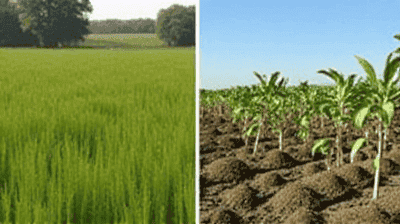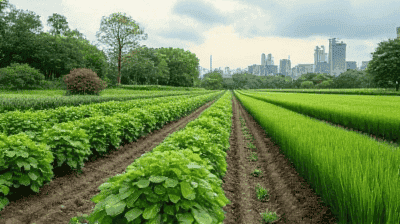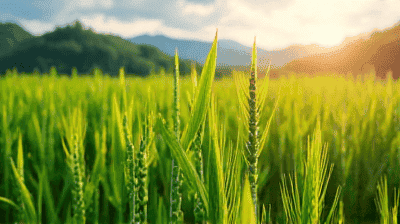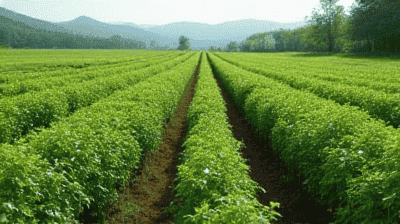
The question of how to sustainably feed the world's growing population has sparked significant debate in the fields of agriculture, environmental science, and food policy. With the global population projected to reach nearly 10 billion by 2050, the challenge of increasing food production while maintaining environmental health has never been more urgent. In the face of pressing issues such as climate change, biodiversity loss, and soil degradation, two predominant models of food production have emerged: small-scale agriculture and industrial agriculture.
Small-scale agriculture refers to farming operations that are typically characterized by their limited size and production capacity. These farms can vary widely in type, from family-owned vegetable plots to community-supported agriculture (CSA) farms or small organic farms. Key characteristics of small-scale agriculture include:
Diversity of Crops: Small-scale farms often grow a variety of crops, which enhances biodiversity and reduces dependency on any single crop.
Local Markets: Many small-scale farmers sell directly to consumers through farmers markets, CSAs, or local grocery stores, fostering community connections and reducing transportation emissions.
Labor-Intensive Practices: Small-scale farms often rely on human labor and traditional farming techniques rather than heavy machinery, leading to more sustainable practices.
Sustainable Practices: Many small-scale farmers emphasize organic, agroecological, and regenerative practices that prioritize soil health, biodiversity, and ecosystem resilience.
Small-scale agriculture offers several significant advantages when it comes to sustainability:
Biodiversity and Resilience: Diverse crop production enhances ecological resilience, making small-scale farms less vulnerable to pests, diseases, and climate variability.
Soil Health: Small-scale farmers often adopt practices such as cover cropping, crop rotation, and organic composting that improve soil health and reduce erosion.
Reduced Emissions: By selling directly to local markets, small-scale farmers can minimize transportation emissions and reduce the carbon footprint associated with food distribution.
Community Engagement: Small-scale agriculture fosters community connections and supports local economies, creating strong ties between farmers and consumers.
Adaptability: Small-scale farms can be more agile in their responses to environmental changes and market demands, allowing for innovative and sustainable practices.
Despite its many benefits, small-scale agriculture is not without its challenges:
Economic Viability: Small-scale farmers often face financial instability due to limited access to capital, fluctuating markets, and competition from larger agribusinesses.
Resource Limitations: Many small-scale farmers struggle with limited access to water, land, and technology, which can hinder their ability to scale up production.
Lack of Support: In some regions, small-scale farmers receive insufficient support from government policies and agricultural extension services, making it harder for them to thrive.
Vulnerability to Climate Change: Small-scale farmers may be more exposed to the adverse effects of climate change, such as droughts, floods, and changing weather patterns.

Industrial agriculture refers to large-scale farming operations that rely on intensive farming techniques and the use of mechanization, chemical fertilizers, and pesticides to maximize production. Key characteristics of industrial agriculture include:
Monoculture Practices: Industrial farms often grow a single crop over vast areas, leading to decreased biodiversity and increased vulnerability to pests and diseases.
Heavy Machinery: The use of tractors and other machinery allows for the efficient planting, maintaining, and harvesting of large-scale crops.
Synthetic Inputs: Industrial farms typically rely on synthetic fertilizers, pesticides, and herbicides to enhance yields and control pests, which can have negative effects on the environment and human health.
Global Supply Chains: Industrial agriculture is often geared toward national and international markets, resulting in complex supply chains that can lead to increased carbon emissions.
While industrial agriculture has been instrumental in increasing food production, it also brings several advantages:
High Efficiency: Industrial agriculture can produce large quantities of food quickly and economically due to mechanization and economies of scale.
Cost-Effective: The high productivity levels of industrial farms can lead to lower food prices in the short term, making food more accessible to consumers.
Reduced Labor Requirements: Automation and heavy machinery reduce the need for manual labor, allowing farms to operate with fewer employees.
Research and Innovation: Industrial agriculture often emphasizes research and development, leading to advancements in biotechnology, crop genetics, and agricultural techniques.
Despite its ability to produce vast amounts of food, industrial agriculture poses significant challenges:
Environmental Degradation: Monoculture practices deplete soil health and contribute to erosion, loss of nutrients, and loss of biodiversity.
Chemical Dependence: The reliance on synthetic fertilizers and pesticides can lead to soil toxicity, water pollution, and negative impacts on human health.
Greenhouse Gas Emissions: Industrial agriculture is a significant contributor to greenhouse gas emissions, contributing to climate change through practices such as land clearing and fertilizer use.
Economic Inequality: The dominance of agribusiness firms can marginalize small-scale farmers and rural communities, leading to economic inequality and loss of traditional farming practices.
Food Sovereignty Issues: Industrial agriculture can undermine local food systems and traditional farming practices, affecting food sovereignty and security in vulnerable regions.
Soil Health: Small-scale agriculture typically prioritizes practices that enhance soil health and prevent erosion, while industrial agriculture's reliance on monoculture and synthetic inputs often leads to soil degradation.
Biodiversity: The diverse planting associated with small-scale farms promotes biodiversity, while industrial agriculture tends to reduce biodiversity through monoculture practices.
Water Usage: Small-scale farming practices are often more sustainable regarding water usage, employing methods like rainwater harvesting and organic farming techniques that reduce water runoff. In contrast, industrial agriculture may rely on intensive irrigation that can deplete local water sources.
Greenhouse Gas Emissions: The transportation and supply chains associated with industrial agriculture contribute significantly to greenhouse gas emissions. Small-scale agriculture, with its emphasis on local markets, generally has a lower carbon footprint.
Access to Markets: Small-scale farmers often sell directly to consumers or local markets, enhancing their economic viability. However, they may still face challenges accessing larger markets or negotiating fair prices. Industrial agriculture benefits from established supply chains and mass distribution, allowing for cost efficiencies and broader reach.
Subsidies and Support: Governments often provide subsidies and support for industrial agriculture, which can lead to a systemic bias in favor of large-scale operations. Small-scale farmers may lack equivalent support despite their contribution to sustainability.
Profit Margins: While industrial agriculture boasts lower food prices due to economies of scale, the profits often accrue to large agribusinesses rather than to the farmers themselves. In contrast, small-scale farmers may experience fluctuating profit margins due to market conditions but are more likely to retain a fair portion of the revenue generated from their products.
Nutritional Diversity: Small-scale agriculture that emphasizes crop diversity often leads to more nutritionally diverse diets. In contrast, the monoculture practices prevalent in industrial agriculture can limit dietary diversity and lead to the overproduction of a few staple crops.
Food Sovereignty: Small-scale farmers contribute to local food systems, enhancing food sovereignty by empowering communities to produce their food. Industrial agriculture, with its reliance on global supply chains, can lead to a disconnection between food producers and consumers.
Resilience to Shocks: Diverse small-scale farms are typically more resilient to economic and climatic shocks, as they can adapt their practices and crop choices more readily than large industrial farms that may depend on specific cash crops.

Appropriate Technology: Small-scale farmers often embrace low-cost, sustainable technologies that improve productivity without compromising environmental health. These may include drip irrigation systems, bicycle-powered tools, or mobile apps for market access.
Community-Based Innovations: Small-scale farmers frequently collaborate and share knowledge, leading to grassroots innovations that are tailored to local conditions and needs.
Agroecological Practices: Many small farmers employ agroecological practices that focus on ecological principles, such as using intercropping, agroforestry, and integrated pest management, to improve productivity sustainably.
Biotechnology: Industrial agriculture heavily invests in biotechnology, leading to the development of genetically modified organisms (GMOs) that can resist pests or tolerate harsh conditions. While these innovations can enhance yields, concerns about biodiversity and health risks persist.
Precision Agriculture: Industrial farms are increasingly adopting technology such as GPS-guided equipment, satellite imaging, and sensors to optimize resource use and maximize efficiency.
Automation and Robotics: Automation plays a significant role in industrial agriculture, reducing labor costs and increasing productivity. However, the displacement of farmworkers raises ethical concerns about the future of agricultural employment.
Access to Funding: Providing financial support and access to credit for small-scale farmers can help them invest in sustainable practices and improve their production capabilities.
Land Security: Ensuring land tenure rights and protections for small-scale farmers is critical to fostering sustainability and empowering communities.
Training and Education: Offering agricultural education and support services can help small-scale farmers adopt sustainable practices and improve productivity.
Local Food Systems: Promoting local food systems through policies that support farmers markets, cooperatives, and community-supported agriculture can strengthen the economic viability of small-scale farmers.
Subsidy Reforms: Reevaluating government subsidies that disproportionately favor industrial agriculture can lead to a more equitable food system that supports sustainable practices.
Regulations for Environmental Protection: Implementing stricter regulations on synthetic inputs and practices that harm the environment can encourage more sustainable agricultural methods in industrial farming.
Market Access for Sustainable Practices: Establishing programs that reward sustainable practices and environmental stewardship can incentivize industrial farmers to adopt greener methods.

Rather than viewing small-scale and industrial agriculture as opposing systems, a more effective approach may involve integrating the strengths of both. This could include:
Partnership Models: Promoting partnerships between small-scale and industrial producers can leverage the efficiencies of industrial agriculture while supporting local economies and sustainable practices.
Shared Resources and Knowledge: Encouraging collaboration and knowledge-sharing between small-scale farmers and industrial operations can foster innovations that enhance sustainability.
Diverse Food Systems: Supporting a diverse range of food production systems can create a more resilient food system, ensuring food security in the face of climate change and economic challenges.
Agroecology: Promoting agroecological principles that emphasize ecology, equity, and sustainability can bridge the gap between small-scale and industrial agriculture.
Sustainable Intensification: Seeking ways to intensify food production sustainably can help meet future food demands while minimizing environmental impacts.
Climate-Resilient Practices: Prioritizing climate-resilient agricultural practices across both small-scale and industrial settings can enhance food security while addressing the impacts of climate change.
The debate between small-scale and industrial agriculture is complex, with both systems offering unique advantages and challenges in the quest for sustainability. While small-scale agriculture champions biodiversity, soil health, and local food systems, industrial agriculture excels in production efficiency and technological advancements. Ultimately, the most effective path forward lies in recognizing the value of both approaches and developing integrative strategies that promote sustainability, resilience, and food security for a growing global population. By fostering collaboration, supporting sustainable practices, and prioritizing the health of our environment, we can create a futurewhere agriculture feeds the world sustainably.